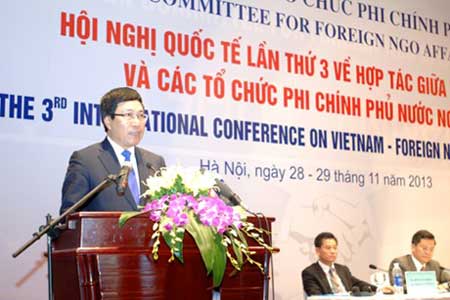On education, both sides will focus on supporting teachers’ training in all levels, building education infrastructure system, education exchanges, assisting in foreign language training and providing voluntary teachers for specialised schools. Also on the focus is the assistance in information technology for schools, especially those in rural, remote and mountainous areas, the intensive training for school students in social vices and the support in clean water and environmental sanitation at school. Social issues will continue to be the cornerstone of cooperative projects with NGOs, focusing on poverty reduction, social welfares for children, the poor, vulnerable groups and ethnic minority people, and the enhancement of proactive engagement of local people as well as Vietnamese partners. NGOs’ cooperation in environmental protection and climate change response will target the greater involvement of the private sector in emergency aid. A seminar on the Agent Orange/Dioxin issues and support for the victims highlighted measures to further speed up the handling of AO aftermaths and improving the living conditions for the victims. In another seminar on overcoming the consequences of unexploded ordnances in Participants also shared their experience and lessons learnt in the field over the past years, while giving positive initiatives to better the work, thus eliminating the risk of losing lives to unexploded ordnances. On vocational training and employment, connections between During a seminar on health care, foreign NGOs suggested the Vietnamese side establish a healthcare working group to process their proposals and advices. They also proposed further simplifying administrative procedures and completing management mechanisms to manage and use their resources. According to the Committee for Foreign NGO Affairs, Over the past decade, NGOs have implemented more than 25,000 programmes, projects and aid packages totalling some 2.4 billion USD, with over 1.12 billion USD coming from North America, 813 million USD from The assistance, which makes up 0.21 to 0.45 percent of Improving legal environment for NGOs The Vietnamese Government committed to improving the legal environment to make it easier for Non-Governmental Organizations (NGOs)’ activities.
Deputy PM and FM Pham Binh Minh made the statement at the third International Meeting on cooperation between Viet Nam and NGOs in Ha Noi on November 28. In the recent years, Thanks to successes in economic growth rate and social welfare, The proportion of poor households decreased from 13.7% in 2008 to 9.6% in 2012. The average income of poor households increased two folds over the past five years. In 2012, the number of poor households reduced 27.6% and the nation’s poor household proportion down 1.76% compared to 2011. In external relations, the relationship between Deputy PM Minh highlighted assistance of NGOs and international partners for Priorities proposed at the meeting Firstly, NGOs will strengthen effective cooperation in their potential fields to be suitable with Secondly, NGOs cooperate with Thirdly, NGOs expand their assistance by launching long-term projects and sustainable aid, increasing knowledge and skills for staffers working in fields of development and poverty reduction. Fourthly, NGOs strengthen cooperative mechanisms with Source: VNA/VGP |
↧
Article 2
↧
